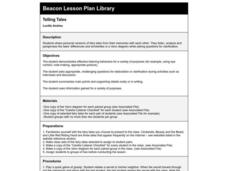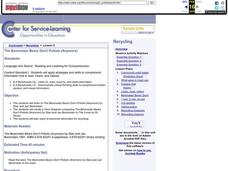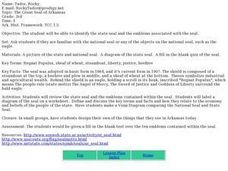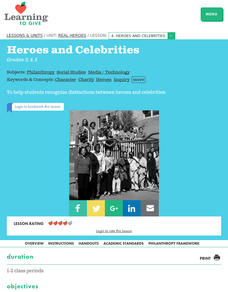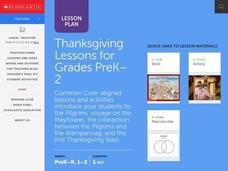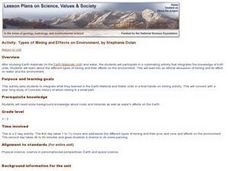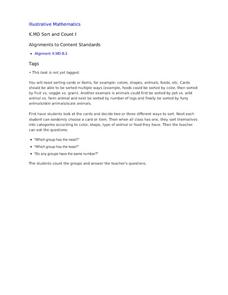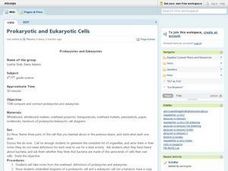Curated OER
Telling Tales
Students verbally tell partners a personal version of a fairy tale to each other. They listen, analyze, and describe the tales' differences and similarities in a Venn diagram.
Curated OER
The Berenstain Bears Don't Pollute (Anymore)
Students listen to the story, The Berenstain Bears Don't Pollute (Anymore). They create a Venn Diagram comparing it with the story, The Lorax. Then students plan ways to become advocates for recycling.
Curated OER
Arkansas Democrat-Gazette Past and Present
Pupils use a Venn diagram to compare and contrast the Arkansas Democrat-Gazette as it was in the past and as it is today.
Curated OER
The Joy of a Garden
Young scholars study environmental stewardship. In this environmental stewardship lesson, students read the story The Gardner and define the character's actions for the environment. Young scholars define philanthropy and complete a...
Curated OER
Contemporary Fairy Tales
Eighth graders listen Steven Kellog's, Jack and the Beanstalk, and Raymond Briggs, Jim and the Beanstalk. They use a Venn diagram to compare the two elements of the two stories. They write and publish an original contemporary fairy tale...
Curated OER
Great Seal of Arkansas
Students identify the state seal of Arkansas and the emblems associated with the seal. They use a Venn diagram to compare the national seal with the state seal.
Curated OER
Social Studies: Chinese Migration to America
Students examine human migrations and hypothesize why Chinese immigrants came to the Pacific Northwest. In groups, they research reasons for the migration and record them on a Venn Diagram with general migratory reasons. Students...
Curated OER
Language Arts: How Can Research Shape Ideas?
Young scholars are able to characterize arsenic and determine its potential health threats in writing. They are able to compare and contrast arsenic to other water pollutants using Venn diagrams. Students are able to demonstrate essay...
Curated OER
The Protestants vs. The Pope
Eighth graders study the Protestant Reformation. Using a Venn Diagram, they compare and contrast the Protestants to Catholicism. Students read selected pages from their text, write notes, and discuss the information. As a class, they...
Curated OER
Africa - Comparison and Contrast Paper
Students discuss as a class different locations in Africa and choose two locations to use for a Venn Diagram for comparison. They then write their comparison and contrast paper over the two locations they chose in Africa.
Curated OER
Author Study - Gerald McDermott
Students listen to story written by author Gerald McDermott, compare and contrast other stories they have read written by same author, create Venn diagrams showing similarities and differences among stories, and determine which story is...
Curated OER
Hereos and Celebrities
Students complete a vocabulary game using new words. They use a Venn diagram to distinguish between a celebrity and a hero. They take a vocabulary quiz to complete the lesson.
Curated OER
The Case of the Missing Water
Students examine the major concepts related to the water cycle in this instructional activity. They recognize and define evaporation, condensation, precipitation and the natural cycles that occur as weather. They also participate in an...
Scholastic
Thanksgiving Lessons Grades PreK-2
A quintessential resource for teaching an elementary unit on the first Thanksgiving addresses a variety of skills, including informational reading, critical thinking, comparing and contrasting facts, technology tools, and historical...
Curated OER
Natural Puerto Rico
Students explore the nature of Puerto Rico. They view a Power Point presentation on world population and discuss how Puerto Rico landscape differs from Wisconsin's landscape. They create a Venn diagram comparing the two and complete a...
Curated OER
Canada - US: Approaches to Immigration
Sixth graders explore the Canadian immigration experience through comparison and contrast to American immigration and settlement patterns. For this immigration patterns lesson, 6th graders dialogue their opinions regarding immigration....
Curated OER
Picasso; Comparing Blue and Rose Periods
Third graders research Picasso's art career. They use a word processor to create a Venn diagram which compares Picasso's Blue and Rose Periods.
Curated OER
Social Studies: Your Family Does What?
Sixth graders compare and contrast their own personal culture with that of Japan. They fill out questionnaires, compile the results, and match them with Japanese answers to the same forms. Students create a Venn diagram of the...
Curated OER
Water and Ice
Young scholars study the water cycle and states of matter. In this water cycle lesson, students observe ice for a period of time and record their observations. Young scholars create a Venn Diagram comparing water in solid form and liquid...
Classroom Adventures Program
Creating Characters
Examine character in depth. Over the course of these six lessons, learners explore their own character traits, determine the traits of characters in the books they read, practice comparing and contrasting, and collaborate in small...
Illustrative Mathematics
Sort and Count
Young mathematicians are on their feet and moving around in this primary grade sorting activity. After giving each child an object or picture card, they then sort themselves into groups, counting to see which has the most or least...
Curated OER
Not the Stereotypical Immigrant? Lesson Plan
High schoolers compare and contrast the differences in African immigrants and traditional immigrants using a Venn diagram. They read the narrative "African Immigration" and examine the goals of African immigrants.
Curated OER
The Librarian from Conneaut School
Second graders identify the elements of the story "The Librarian from the Black Lagoon." They listen to the story and list the story elements of character, settling, problem, and solution. They then use KidPix to create individual...
Curated OER
Prokaryotic and Eukaryotic Cells
Students compare and contrast prokaryotes and eukaryotes. They name the organelles that are present in prokaryotes only and identify their functions. Students label the diagrams of the prokaryotic cell and the eukaryotic cell.
